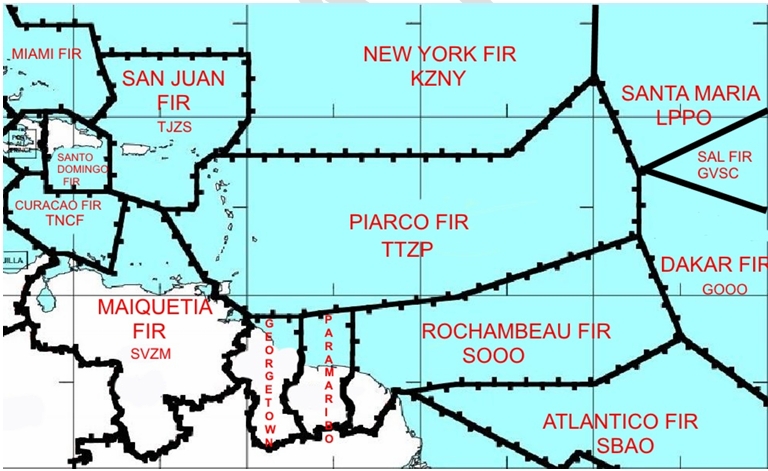Trinidad’s Control Over Upper Airspace: A Call for Transparency and Equitable Distribution.
The Government of Saint Vincent and the Grenadines (SVG) is hoping to hold discussions in relation to sharing the benefits derived from the control of Trinidad and Tobago (T&T) over the Piarco Flight Information Region (FIR).
The Piarco Flight Information Region (TTZP) is a region of airspace over the Eastern Caribbean, controlled by Trinidad and Tobago. It extends from approximately 10° to 18° North Latitude and from roughly the mid-Atlantic (38° West Longitude) to 65° West Longitude.
This airspace includes the area from Antigua in the north to Trinidad in the South, and East of Barbados, stretching almost halfway across the Atlantic Ocean towards Africa.
Speaking on the issue during a press conference on Friday July 1 1 th, 2025, Prime Minister Dr. Ralph Gonsalves said that recent discussions have brought to light the ongoing issue surrounding the management of airspace, which continues to be controlled by Trinidad and Tobago (T&T).
“…they (T&T) make the money from the space that’s part of our property…,” Prime Minister Dr. Gonsalves.
He stressed that this control has led to questions about the financial benefits derived from this airspace, as well as concerns regarding transparency and fairness in its administration.
Explaining the issue, the Prime Minister said the airspace, commonly referred to as the Piarco Flight Information Region (FIR), stretches from Trinidad all the way up to Saint Kitts and Nevis. Originally established during the colonial era, the region was managed by a combination of the colonial government and a private firm.
Following independence, the late Dr. Eric Williams, former Prime Minister of Trinidad and Tobago, organized for the country to maintain control over this vital airspace.
The Prime Minister said this control has left neighbouring countries, including Barbados and the Eastern Caribbean States (OECS), excluded from the governance and financial benefits tied to the region.
He said that the airspace is a shared resource, and yet the countries that are most impacted by its management are not part of the decision-making process. He added that there is no transparency in the accounting, no visibility into how the funds generated are being distributed, and no involvement from the countries whose airspace is affected.
It was noted that while airspace management is difficult to grasp, the underlying issue is simple. The airspace above countries is part of their territorial domain, yet they are locked out of reaping the benefits from its use.
The Prime Minister said that Trinidad and Tobago collects revenue from the region, while other nations, particularly Barbados and the OECS countries, find themselves excluded from any financial gain or influence over the management of the space.
In contrast, French territories like Martinique and Guadeloupe have an established agreement with the United Kingdom (UK) that has continued seamlessly since the colonial era, ensuring they benefit from the same airspace management system.




